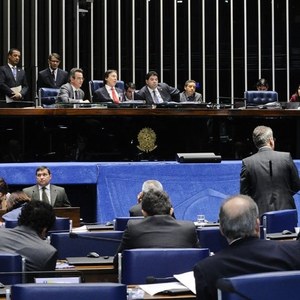Brazil's Senate passes bill creating a national biofuels policy

Photo: Agência Senado
December 15, 2017
BY Ron Kotrba
Brazil’s Senate approved a bill Dec. 12 creating a national biofuels policy, RenovaBio, to increase use of biodiesel and ethanol, in addition to other biofuels. RenovaBio is a state policy that aims to recognize the strategic role of all types of biofuels in the national energy matrix, both for energy security and for reducing greenhouse gas (GHG) emissions.
Sen. Álvaro Dias praised the project for ensuring “modernity, technological advancement and the development of the country with the necessary environmental preservation.”
Advertisement
Advertisement
Among the goals of RenovaBio are contributing to Brazil’s compliance with the Paris Agreement on Climate Change, ensuring energy efficiency and reducing GHG emissions, expanding production and use of biofuels, and ensuring the competitiveness of these sources in the national market.
To achieve these objectives, the legislation proposes the use of targets for mandated blending of biofuels with fossil fuels, certification, fiscal, financial and credit incentives, as well as actions in accordance with the Paris Agreement. The text also proposes the use of carbon credits, granted to biofuel producers according to the proportion of clean energy produced by them. The higher the ratio, the more credits the company will receive. The credits will be traded on the stock exchange and bought by sectors that need them to offset their own carbon emissions.
Sen. Cidinho Santos said Brazil is the second largest producer of biofuels in the world, having generated 27 billion liters of ethanol and 4.2 billion liters of biodiesel in 2017. It was noted in a Senate press release that Brazil never had a specific policy for biofuels together.
Advertisement
Advertisement
“It’s not a proposition that deals only with ethanol and biodiesel,” Santos said. “There is a notable potential for commercial insertion for biogas, biomethane and aviation biokerosene. In this way it will be a public policy that for the first time will stimulate and recognize the role of biofuels for energy security and their role in reducing the emission of greenhouse gases in the fuel sector.”
The legislation now goes to President Michel Temer for signing into law.
Related Stories
CoBank latest quarterly research report highlights current challenges facing the biobased diesel industry. The report cites policy uncertainty and trade disruptions due to tariff disputes as factors impacting biofuel producers.
The U.S. EIA on April 15 released its Annual Energy Outlook 2025, which includes energy trend projections through 2050. The U.S. DOE, however, is cautioning that the forecasts do not reflect the Trump administration’s energy policy changes.
Iowa Secretary of Agriculture Mike Naig on April 10 announced that the Iowa Renewable Fuels Infrastructure Program board recently approved 114 project applications from Iowa gas stations, totaling more than $2.88 million.
The USDA on April 14 announced the cancellation of its Partnerships for Climate-Smart Commodities program. Select projects that meet certain requirements may continue under a new Advancing Markets for Producers initiative.
The governors of Iowa, Nebraska, South Dakota and Missouri on April 10 sent a letter to U.S. EPA Administrator Lee Zeldin urging the agency to set higher Renewable Fuel Standard renewable volume obligations (RVOs).
Upcoming Events










